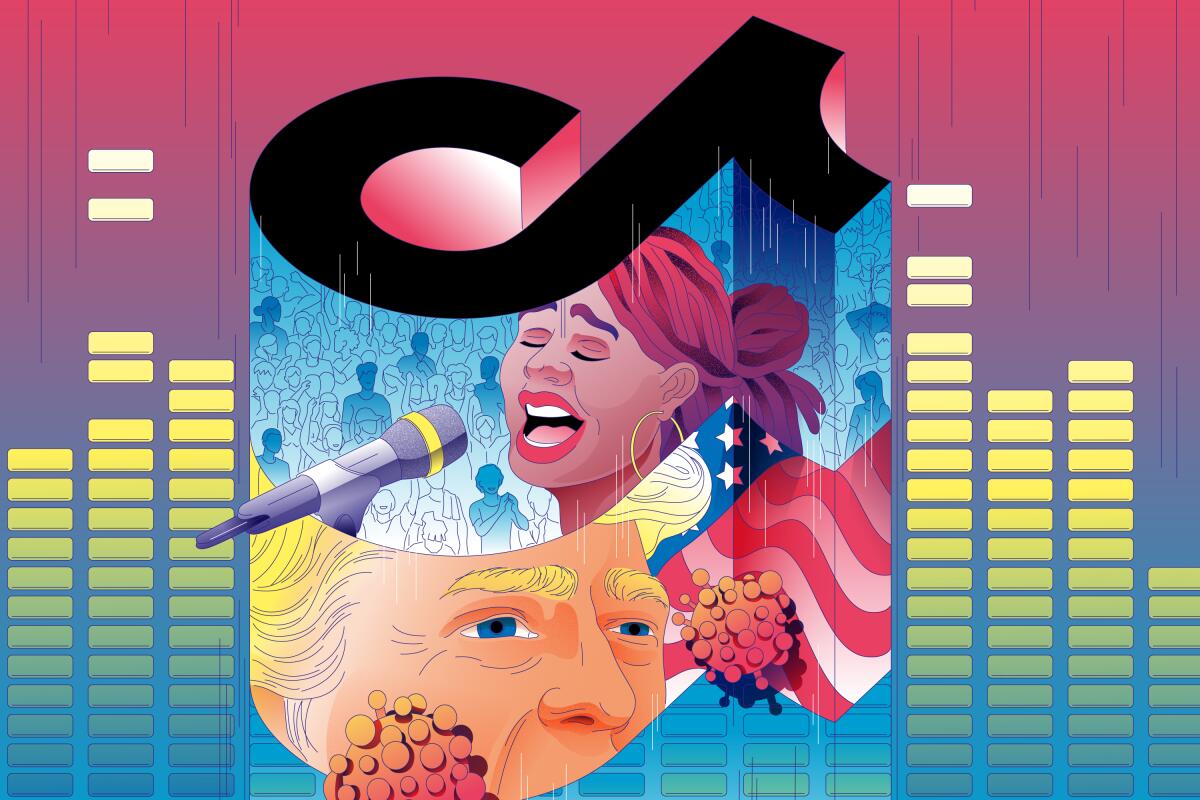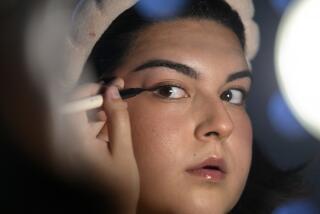TikTok has been saved. But for music, is that a good thing?

Jack Rutter was in a low place when he recorded the song that changed his life.
The 20-year-old Salt Lake City native, who makes dreamy indie rock under the name Ritt Momney, had set out on tour this spring when COVID-19 shut down the live music business. Suddenly adrift, and with seemingly the entire world in an unprecedented funk, “I drove home to my parents’ house and was just in the basement — like, ‘OK, what can I do to help my mental health in some way?’” Rutter recently recalled.
He remembered an “incessantly positive” tune that his mom used to play when he was growing up — 2006’s “Put Your Records On” by the British folk-soul singer Corinne Bailey Rae — and laid down a shimmering cover version that he posted online in late April.
“It was meant as kind of a pick-me-up,” he said. But what it’s become is bigger: This month, a young makeup artist with the handle Skiian used the song to soundtrack a brief video on TikTok, the wildly popular social media platform; the clip went viral, spawning tens of thousands of imitators and driving listeners to Rutter’s take on “Put Your Records On.” Now his track is being streamed approximately half a million times every day on Spotify — enough to move past major-label smashes by Post Malone and Roddy Ricch on the streaming service’s closely watched U.S. top 50 chart.
@skiian 10sec vs 3 hours - thankyall so so much for all the love and for recreating my video 🥺❤️ ##RaiseYourGame ##MakeupRoutine ##fyp
♬ Put Your Records On - Ritt Momney
At a moment when your smartphone can feel like the center of the universe, Ritt Momney’s story embodies the democratic promise of TikTok, where regular kids anoint new hits according to their own tastes as opposed to the dictates of traditional music biz gatekeepers.
“It seems like it’s turning the industry on its head,” Rutter said of the app, which claims 100 million users in the United States (and just struck a deal with Oracle and Walmart to allay President Trump’s concerns about its parent company’s Chinese ownership). “The randomness of it takes a lot of the power away from the labels.”
Yet nothing attracts gatekeepers like an open gate. Last week Ritt Momney signed to Columbia Records’ Disruptor imprint, the latest in a rapidly growing number of major-label deals for acts with breakout songs on pop’s busiest hitmaking platform. Megan Thee Stallion’s “Savage,” Benee’s “Supalonely” and Saint Jhn’s “Roses” each can trace its success to TikTok, which lets users easily create short-form videos set to music.

The record industry’s clear hunger for more raises two questions for the future: Is the very sound of pop changing to adapt to TikTok? And can these new viral stars become anything more than one-hit wonders?
“It’s like the disco era,” said one longtime music insider who requested anonymity to speak freely, invoking that late-’70s age when labels signed anything with a four-on-the-floor beat — only to see the bubble burst and be left with warehouses full of unsold 12-inches. “Maybe a Donna Summer emerges. Or maybe it’ll be a bunch of Gloria Gaynors.”
With artist-friendly Bandcamp Fridays and initiatives that benefit progressive causes, the online music platform has become beloved beyond its indie roots.
How did TikTok, which faces fresh competition from newcomers Triller and Instagram Reels, arrive at its powerful position? “It’s a combination of product and timing,” said Celine Joshua, an executive vice president who works in artist development and digital strategy at the world’s largest record company, Universal Music Group. She was referring to the COVID-19 pandemic, which isn’t to say that TikTok wasn’t a big deal before widespread stay-at-home orders parked countless teenagers in front of their phones beginning in March.
In 2019, less than a year after it was introduced as a rebranded form of the popular lip-sync app Musical.ly, TikTok propelled Lil Nas X’s “Old Town Road” to a record-setting run atop Billboard’s Hot 100; Ricch followed him up the chart, reaching No. 1 in January with his endlessly TikTok’d “The Box.”
“But the massive onboarding happened during quarantine,” Joshua said. And once the users were there, TikTok quickly became the most important promotional game in town.

Terrestrial radio still creates hits, said another seasoned executive who spoke on the condition of anonymity, pointing to Lewis Capaldi’s 2019 piano ballad “Someone You Loved.” But radio’s highly coveted Gen Z/millennial audience is smaller than TikTok’s, and the old-fashioned platform moves more slowly; “Someone You Loved” took 24 weeks to top the Hot 100, compared with 10 for “Savage.”
“So you’re telling me to spend 150 or 200 grand a month [on radio promotion] to get a maximum of 23 to 25 million monthly listeners?” the exec scoffed. “What’s happening on TikTok is much bigger in scale. And people are on 24/7.”
What’s more, they’re being inundated while they’re there: Corey Sheridan, head of music content and partnerships for TikTok in North America, says a user scrolling through the app’s algorithmic For You feed might hear the same song in five different videos in five minutes — more exposure than even the heaviest rotation on Top 40 can offer (or inflict, as the case may be).
Thus the scramble to snap up artists trending on TikTok — in addition to Ritt Momney, Columbia has signed the emo-rap yowler 24kGoldn (“Mood”) and the raunchy ppcocaine (“3 Musketeers”), while Arista Records has signed the San Bernardino-based WhoHeem (“Lets Link”) and Republic Records the slyly cheerful Claire Rosinkranz (“Backyard Boy”) — or to get songs by established artists into the app’s bloodstream.
‘The Meaning of Mariah Carey,’ the pop star’s tell-some memoir, sparkles and entertains and explains its subject, despite a few too many I-don’t-know-hers.
Often that means paying influencers for access to their huge followings; Rolling Stone recently reported that TikTok’s most-followed personality, 16-year-old Charli D’Amelio, can charge as much as $40,000 to dance to a track in a video likely to be seen — and no doubt emulated — by her 88 million followers.
Yet the pay-to-play approach doesn’t always work. Taz Taylor, a 27-year-old producer and entrepreneur whose hits include Lil Tecca’s “Ransom” and Trevor Daniel’s “Falling,” said he put together “a real unorganic campaign with a big TikToker” for the single “Lemonade” by his hip-hop collective Internet Money.
@joyy.li its the getting out of bed at 3pm for me
♬ Lemonade Internet Money - joy:)
“But the version they did only got like a million likes” — nothing to crow about on TikTok — while a “Lemonade” video by “some other random girl” exploded out of nowhere. Tilting his phone toward the screen during a recent Zoom chat, Taylor proudly showed off a data report that said “Lemonade” had been used in 750,000 TikToks over the previous week.
Smarter then, perhaps, to try to reverse-engineer the kind of song that tends to go viral on TikTok, as some artists are starting to do, UMG’s Joshua said. Streaming services are awash right now in tracks with a transitional moment like a key change or a beat drop — something a user might build a video around (as in the many clips set to “Put Your Records On,” in which a person reveals a complicated makeup design just as the drums kick in).
Lizzy Szabo, a Spotify editor who oversees some of that service’s more internet-attuned playlists, said there’s no single sound of TikTok. But she sees consistent qualities across successful songs, including a “playful” vibe and “honest, relatable” lyrics that lend themselves to being meme-ified. More important still, she said, is the kind of on-the-spot legibility of a tune like “Backyard Boy,” which opens with Rosinkranz cooing, “Dance with me in my backyard,” over a peppy indie-pop groove.
“You can envision that scene immediately,” Szabo said — crucial on a platform that typically uses music in 15-second chunks.

Asked if he’s changed his production style to suit TikTok, Taylor said no, which is maybe to be expected: Among some hip-hop fans, especially cool-obsessed young men, a song’s taking off on TikTok can be viewed as evidence that it’s overripened. Yet it’s worth noting that the Kid Laroi, who appears on Internet Money’s album, released a song earlier this year titled “Addison Rae” after one of the app’s most popular influencers.
And that’s not the only TikTok song about TikTok: Drake’s chart-topping “Toosie Slide” spun out of a viral video by the dancer known as Toosie, while JVKE’s neo-disco “Upside Down,” a top-10 hit on Spotify’s Viral 50 tally, interpolates identifiable parts of several earlier TikTok clips.
“It gave him instant familiarity on the platform,” Joshua said of the largely unknown JVKE. “I think we’re going to see a lot more mash-ups like that.”
@jvke when the beat drops😭ayo momma never disappoints ##fyp
♬ All TikTok Mashup (JVKE - Upside Down) - JVKE 🌩
For the moment, JVKE is one of a dwindling number of TikTok hitmakers yet to announce they’ve teamed with a label. But what about those, like Ritt Momney and Avenue Beat and Jawsh 685, who have? It’s too early to say whether these young talents will be able to reproduce the trick that got them signed, though results so far are less than inspiring, as one prominent exec with a digital background said in regard to StaySolidRocky’s “Party Girl,” a woozy hip-hop track that has more than 290 million streams on Spotify.
“If you look on a streaming-consumption basis, that song is a whale — an absolute smash hit,” this person said. Yet “the three or four singles that he’s followed up with as an artist have completely bombed.” (A spokeswoman for StaySolidRocky’s label, Columbia, countered by saying that the rapper “has not dipped below 13 million monthly listeners since May of 2020, keeping an engaged fan base on Spotify for 4-plus months.”)
The problem, many insiders say, is that companies are chasing hits without building the foundations of long-term careers.
“It’s nice eating candy for a while, but you can’t live off it,” said Zach Friedman of HomeMade Projects, the indie label behind “Mad at Disney,” a viral TikTok song by the singer Salem Ilese. “You have to invest in songs that won’t necessarily go viral on the platform. If you don’t believe in the artist, in their catalog, that’s not a good business model.”

The majors insist they do believe in their artists, of course — even if the economics of streaming, in which labels are paid according to their market share, incentivize them to find as many monster hits as quickly as possible. In signing his deal, Ritt Momney’s Rutter said he figured he was “giving them ‘Put Your Records On’” — that is, giving Disruptor a cut of whatever the song will continue to earn with each stream — “in exchange for what they’re going to give me for my next album.”
With touring and many other promotional options off the table thanks to COVID, though, building interest in that next album will be difficult. “There has to be a world to dive into,” said Friedman, in order to cultivate the type of fan loyalty we associate with pop stars of the (very recent) past.
You can look at Lil Nas X — a natural charmer who’s spoken openly about his experiences as a gay man in hip-hop and a black man working with country-music themes — as the rare TikTok star to foster a connection with his audience that’s more about a person than about a song. In January he even won a couple of Grammy Awards.
Yet that notion of success frames TikTok as a springboard to more traditional music ecosystems, whereas the app’s dramatic growth since March — and the unlikelihood of live music’s return any time soon — may mean an artist can simply continue to thrive within TikTok. Certainly TikTok would like that, as Sheridan made clear when he described his determination to “bring more monetization opportunities for artists,” including a merch store Jaden Smith launched this month, to the platform. (Like other streaming services, TikTok pays to license music from various rights holders, who are expected to divvy up the money among a song’s creators.)

Consider too that this past summer Charli D’Amelio’s older sister, Dixie, released her debut single as a pop singer — a tune she didn’t need to pay anyone else to hype with a new dance routine.
TikTok’s friction with the famously volatile president threatened the app’s stability to the point that the D’Amelios recently announced they’d joined Triller. Even with the Oracle deal in place, “Anyone who claims to know where this is going for sure should be running for president,” joked one veteran songwriter turned manager whose clients have fared well on TikTok.
Eunice Shin, a partner at the branding and media consultancy Prophet, said the alignment with Oracle (whose founder Larry Ellison is a high-profile Trump supporter) won’t affect TikTok’s brand. “Consumers don’t care where in the cloud their content is being stored,” she said. But even if TikTok were to transform somehow, nearly all in the industry agree that the relationship between music and short-form videos — wherever it plays out — will only strengthen with time.
“Denying that,” the manager said, “is denying a creative climate change, whether we like it or not.”
More to Read
The biggest entertainment stories
Get our big stories about Hollywood, film, television, music, arts, culture and more right in your inbox as soon as they publish.
You may occasionally receive promotional content from the Los Angeles Times.











